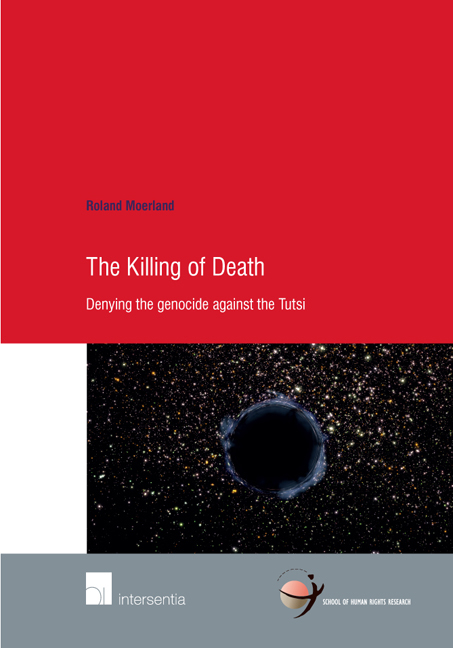Book contents
- Frontmatter
- Dedication
- Preface
- Contents
- List of abbreviations
- Table of figures
- Introduction
- Part I Exploration
- Part II Inspection
- Chapter 4 Official denial of the genocide against the Tutsi
- Chapter 5 Recycling official denial
- Part III Reflection
- Chronological overview of significant interviews, consultations and events
- Selected bibliography
- Curriculum vitae
- School of Human Rights Research Series
Chapter 4 - Official denial of the genocide against the Tutsi
from Part II - Inspection
Published online by Cambridge University Press: 21 September 2018
- Frontmatter
- Dedication
- Preface
- Contents
- List of abbreviations
- Table of figures
- Introduction
- Part I Exploration
- Part II Inspection
- Chapter 4 Official denial of the genocide against the Tutsi
- Chapter 5 Recycling official denial
- Part III Reflection
- Chronological overview of significant interviews, consultations and events
- Selected bibliography
- Curriculum vitae
- School of Human Rights Research Series
Summary
Introduction
Ever since the genocide against the Tutsi was planned, organised and implemented, those responsible have been engaging in a virulent denial of the genocide that obscures the true nature of what they have been involved in (Ndahiro, 2008, p. 102; Totten & Bartrop, 2009, p. 518). The group of responsible actors is broad and varies from governmental, military and political actors officially aligned with the former regime to civil, media and religious actors who supported their cause. The analysis in this Chapter will primarily focus on addressing the official denial of the genocide against the Tutsi. The term “official denial” denotes the genocide denial of governmental, military and political organisations that were officially aligned with the former regime and were somehow involved in the planning, organisation and/or implementation of the genocide. The focus on official denial is pertinent because, although this issue has been briefly addressed in several studies, it has not been extensively and systematically analysed. Furthermore, official genocide denial, due to the power of the institutions disseminating it and because of its highly ideological content, has had (and still has) a substantial impact on people. The analysis of official genocide denial provided for in this Chapter is based on official documentation authored by the following organisations: the Rwandan Interim Government (RIG), the Rwandan Armed Forces (RAF) and the Rassemblement pour le Retour des Réfugiés et la Démocratie au Rwanda (RDR). In contrast to the other organisations mentioned, the RDR (Alliance for the Return of Refugees and Democracy in Rwanda) was created after the extermination phase of the genocide against the Tutsi was implemented. As will become clear throughout this Chapter, the RDR was established after the official government and military were dissolved and its members came to include many former government and military personnel. The records of the RIG, the RAF and the RDR are remarkable and powerful illustrations of official efforts to deny the genocide against the Tutsi. They are therefore also exemplary of other instances of denial by those implicated in the genocide against the Tutsi. The first Sections of this Chapter introduce the aforementioned organisations and discuss the documents authored by these organisations, on which the analysis throughout the rest of the Chapter relies.
- Type
- Chapter
- Information
- The Killing of DeathDenying the genocide against the Tutsi Roland Moerland, pp. 137 - 186Publisher: IntersentiaPrint publication year: 2016

